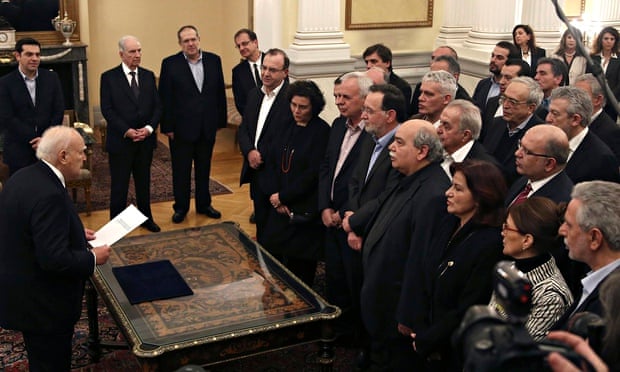Helena Smith in Athens and Ian Traynor in Brussels Wednesday 28 January 2015
New finance minister says debt negotiations will not continue with hated troika of technocrats representing foreign lenders

Newly appointed ministers and deputy ministers attend a swearing-in ceremony at the presidential palace in Athens. Photograph: Panagiotis Tzamaros/Reuters
Greece’s prime minister, Alexis Tsipras, has lined up a formidable coterie of academics, human rights advocates, mavericks and visionaries to participate in Europe’s first anti-austerity government.
Displaying few signs of backing down from pledges to dismantle punitive belt-tightening measures at the heart of the debt-choked country’s international rescue programme, the left-wing radical put together a 40-strong cabinet clearly aimed at challenging Athens’s creditors.
In a taste of what lies ahead, Yanis Varoufakis, the flamboyant new finance minister, said on his way to the government’s swearing-in ceremony that negotiations would not continue with the hated troika of officials representing foreign lenders.
“They have already begun but not with the troika,” said Varoufakis, an economist who has disseminated his anti-orthodox views through blogs and tweets almost daily since the debt crisis exploded in Athens in late 2009 – something he promised on Tuesday to continue to do. “The time to put up or shut up has, I have been told, arrived,” he wrote on his blog. “My plan is to defy such advice.”
Tsipras’s Syriza party, which emerged as the winner of snap polls on Sunday, has been adamant that it will deal only with governments, and not the technocrats that represent the EU, ECB and IMF. Varoufakis is to represent Greece at Eurozone meetings.
Setting its stamp on the new era, the cabinet took the oath of office in two separate ceremonies, with some sworn in during a religious service but most breaking with tradition to conduct their investiture before the president, Karolos Papoulias.
Tsipras, an avowed atheist, was sworn in by Papoulias on Monday. At 40 he is Athens’s youngest post-war prime minister.
After falling two seats short of attaining a 151-seat majority in Greece’s 300-seat parliament, Syriza was forced into a coalition with the populist right-wing Independent Greeks party.
The junior partner is openly Eurosceptic and withering of the way international creditors have turned Greece into an “occupied zone, a debt colony”. Its leader, Panos Kammenos, who has declared that Europe is governed by “German neo-Nazis”, assumes the helm of the defence ministry.
Tsipras acted on pledges to pare back government with the establishment of 10 ministries and four super-ministries amalgamating different portfolios, starkly illuminating the failure of previous Greek governments to act on promises to reform ministry structures.
Giorgos Stathakis, a political economics professor, took over the development portfolio, a super-ministry that includes oversight of tourism, transport and shipping, the country’s biggest industries.
Panaghiotis Kouroublis, who is blind, was made health minister, becoming the first Greek politician with a disability to hold public office.
Euclid Tsakalotos, a British-trained economist who rose out of the anti-globalisation movement, became deputy minister in charge of international economic relations.
Panaghiotis Lafazanis, a Marxist who heads Syriza’s far-left faction, was put in charge of the super-ministry incorporating energy, industry and environmental affairs. He has openly opposed any concessions being made with Greece’s creditors when stalled negotiations over completing the country’s current bailout programme resume.
Syriza says its priorities will be to cancel austerity and renegotiate the country’s “unsustainable” €320bn (£238bn)debt load. With time now of the essence – Athens’s rescue funds expire at the end of February – reaction ranged from trepidation to applause. Greek markets endured a second day of turmoil on Tuesday, with bank shares diving and investors fearing that the anti-bailout government might be set on a collision course with creditors.
The government’s plan to negotiate a new debt deal has already run into resistance from its Eurozone peers, which fear that allowing Athens to write off some of its obligations would encourage other troubled countries such as Spain and Ireland to seek similar relief.
Germany’s finance minister, Wolfgang Schäuble, on Tuesday dismissed assertions that Greece’s plight was due to the savage austerity measures imposed by Europe over the past five years in return for €240bn in bailout funds.
“The people of Greece are suffering more than people elsewhere in Europe,” he said. “Not because of demands from Brussels or the ECB, but because of the failure of Greek political elites over decades.” The pressure on the Tsipras government to honour the terms of the bailout deals struck by the previous two Greek governments – terms the new prime minister in Athens has threatened to repudiate – was quite correct, Schäuble declared.
“The demands on Greece are in line with the ECB’s mandate. They are fully legitimate.” He said European solidarity with countries in economic and financial distress was no substitute for those countries having to decide how to act themselves. “Solidarity cannot replace necessary decisions by member states.”
Deploying a tactic he commonly uses when opposing a policy switch, Schäuble warned that any shift would require a renegotiation of EU treaties. “I witness a growing call from a number of member states to stick to the legal framework that is in place now,” he said. “Changing the rule book would require a huge struggle to get the people on board in Germany, but also in other member states.”
Observers welcomed the Syriza-led government’s administrative reforms and its decision to appoint a minister whose writ will be to crack down on widespread tax evasion and corruption in the upper echelons of society. “It sends clear messages of the new government’s appetite to deal with corruption and … problems of the Greek state,” said George Kyris, a lecturer at Birmingham University.
But many also fear that the government is headed for confrontation with the bodies that have kept the insolvent Greek economy afloat. “It includes neo-Stalinists and anti-orthodox economists with little idea how to deal with Europe,” said Prof Dimitirs Keridis, a political scientist at Panteion University, Athens. “I am afraid that it presages confrontation, but perhaps that is what Tsipras wants.”
The radicals have dismissed criticism that they will not be up to the task of governance. Speaking to the Guardian recently, Tsakalotos said there would never be a good time for the leftists to assume power in a political world that had moved increasingly to the right.
“We would always face market pressure and opposition,” said the Oxford-educated academic, who will be responsible for attracting badly needed foreign investment. “Any difficulty that we might face should make us work harder, plan more thoroughly, become more decisive.”
Assets stripped
To the victor the spoils? Not in Athens, where the new prime minister arrived at his official residence on Monday night to discover that computers, paperwork and even the toiletries had been removed by the outgoing administration.
Shortly after he was sworn in, Syriza leader Alexis Tsipras found himself inside the Maximos Mansion without some basic necessities. “They took everything,” he said. “I was looking for an hour to find soap.”
Traditionally, a defeated Greek prime minister will wait until their successor has been anointed to wish them well. But Antonis Samaras was in such a rush to go that he even failed to leave the Wi-Fi password.
“We sit in the dark. We have no internet, no email, no way to communicate with each other,” one staffer told Germany’s Der Spiegel.It took until Tuesday evening for Tsipras to get his hands on the official prime ministerial Twitter account. In his first tweet, he repeated the oath he took 24 hours earlier, pledging to uphold the constitution and always serve the interests of the Greek people.
But on Tuesday night, the new administration was struggling to put its mark on the system; 48 hours after the polls closed, an official Greek government website still showed Samaras as prime minister.
Graeme Wearden
Greek PM Alexis Tsipras unveils cabinet of mavericks and visionaries | World news | The Guardian
![The [Greek] European Tragedy](https://blogger.googleusercontent.com/img/b/R29vZ2xl/AVvXsEiWKI5s90SFm1wWTk6bs4p7CgslaC2SnYPsrZhb-B-smOufNNCSxCvpBLI9hOB-LsXZjir_PNmEiMk2-E62F3xkg96IoC6QFAaZAnPRTVH340IN9WBRmWJqPkjWlgyRj3zpALp7h6hvA58/s920/GkBack_new.jpg)
